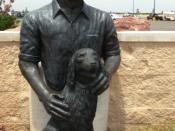Sam Walton founded Wal-Mart in 1962; the first store was opened in Rogers, Ark. Since 1962 Wal-Mart has grown to be the worlds largest retailer more than 3,200 facilities in the United States and over 1,100 in Mexico, Puerto Rico, Canada, Argentina, Brazil, China, Korea, Germany, and the United Kingdom. Part of their success in America is that Wal-Mart prides itself by focusing on the fact that it is an "all American" company that offers low prices to their customers. By having this image, it leads their consumers to believe that their products are made in America and they do not support sweatshops. Despite Wal-Mart's image there have been many allegations that they are doing businesses with factories in international places such as El Salvador, Myanmar (also known as Burma), and Bangladesh who are known to have factories that are sweatshops. In their defense Wal-Mart has the following on their web page about their involvements with international factories:
"Wal-Mart strives to do business only with factories run legally and ethically.
We continue to commit extensive resources to making the Wal-Mart system one of the very best. We require suppliers to ensure that every factory conforms to local workplace laws and that there is no illegal child labor or forced labor. Wal-Mart also works with independent monitoring firms to randomly inspect these factories to help ensure compliance. In fact, we conduct more than 200 factory inspections each week to ensure these facilities are being run legally and ethically."
Other than this single paragraph, the Wal-Mart site does not have any further information on this topic.
The main question that is posed here by Wal-Mart doing the inspections of these factories is whose responsibility is it to ensure the employees of these factories are being treated fairly? Should it be the company...


